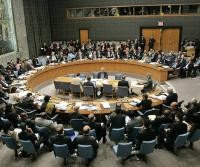One global issue that looks to become more prominent in 2011 is that of United Nations Security Council (UNSC) reform. Several world leaders -- including Presidents Barack Obama, Dmitry Medvedev, and Nicolas Sarkozy -- have recently called for adding new members to the council, while others want to overhaul its structure and procedures. But the reformers must overcome a potential obstacle: The council just may be incorrigible by design.
Most U.N. reform debates focus on how to change the Security Council to make it more representative and democratic. With respect to the former issue, the primary concern has been that, since its establishment in 1945, the UNSC has gradually become less-representative of total U.N. membership, which has more than tripled since World War II. Although the number of non-permanent members on the council was increased from 6 to 10 in 1965, reformers want a more fundamental transformation in the body's composition.
But membership expansion invariably raises related questions. The main issues of debate are: how many additional countries should receive representation on the council; which specific countries should be added; what categories of membership should exist; whether any additional states should receive permanent membership with veto power; the precise scope of the veto in general; and the relationship between the Security Council and the other U.N. organs, especially the General Assembly.

